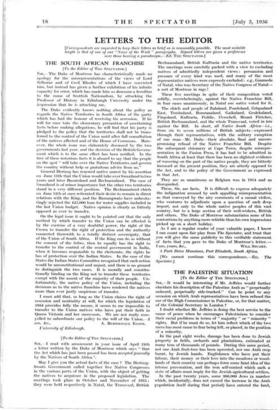THE SOUTH AFRICAN FRANCHISE
LETTERS TO THE EDITOR
[Correspondents are requested to keep their letters as brief as is reasonably possible. The most suitable length is that of one of our "News of the Week" paragraphs. Signed letters are given a preference over those bearing a pseudonym.—Ed. THE SPECTATOR.] [To the Editor of TILE SPECTATOR.] SIR,—The Duke of Montrose has characteristically made no apology for the misrepresentations of the views of Lord Selborne and of Cecil Rhodes of which I have convicted him, but instead has given a further exhibition of his infinite capacity for error, which has made him so damnosa a hereditas to the cause of Scottish Nationalism, by attacking the Professor of History in Edinburgh University under the impression that he is attacking me.
The Duke evidently knows nothing about the policy as regards the Native Territories in South Africa of the party which has had the honour of receiving his accession. If he will for once take the elementary precaution of ascertaining facts before making allegations, he will find that his party is pledged to the policy that the territories shall not be trans- ferred to the control of the Union until after full consultation of the natives affected and of the House of Commons. More- over, the whole issue was elaborately discussed by the two governments last year, and the decision of the British Govern- ment which is to the same effect has been notified. In the face of these notorious facts it is absurd to say that the people on the spot " will take over the Native Territories and govern the country without help or gratuitous advice from us."
General Hertzog has renewed native unrest by his assertion on June 11th that the Union would take over Swaziland in two years and later Basutoland and Bechuanaland. The ease of Swaziland is of minor importance but the other two territories stand in a very different position. The Bechuanaland chiefs on June 12th at once reiterated their desire to remain in direct relations with the King, and the Bamangwato have unhesita- tingly rejected the £25,000 loan for water supplies included in the last Union budget. Native opinion is clearly as bitterly opposed as ever to transfer.
On the legal issue it ought to be pointed out that the only method by which transfer to the Union can be effected is by the exercise of a very doubtful power, the right of the Crown to transfer the right of protection and the authority connected therewith to a totally distinct sovereignty, that of the Union of South Africa. If the King can do so without the consent of the tribes, then he equally has the right to transfer to the control of the central government in India, when it becomes responsible to the electorate, the rights he has of protection over the Indian States. In the case of the States the Indian States Committee recognised that such action would be unconstitutional and unjust, and there is no ground to distinguish the two cases. It is morally and constitu- tionally binding on the King not to transfer these territories except with the assent of the majority of their people. Un- fortunately, " the native policy of the Union, including the decisions as to the native franchise have rendered the natives more than ever justly suspicious of transfer.
I must add that, so long as the Union claims the right of secession and neutrality at will, for which the legislation of 1934 provides fully the means, it seems to me impossible to transfer to the Union natives who have put their faith in Queen Victoria and her successors. We are not really com- pelled to subordinate our policy to the will of the Union.—I














































 Previous page
Previous page